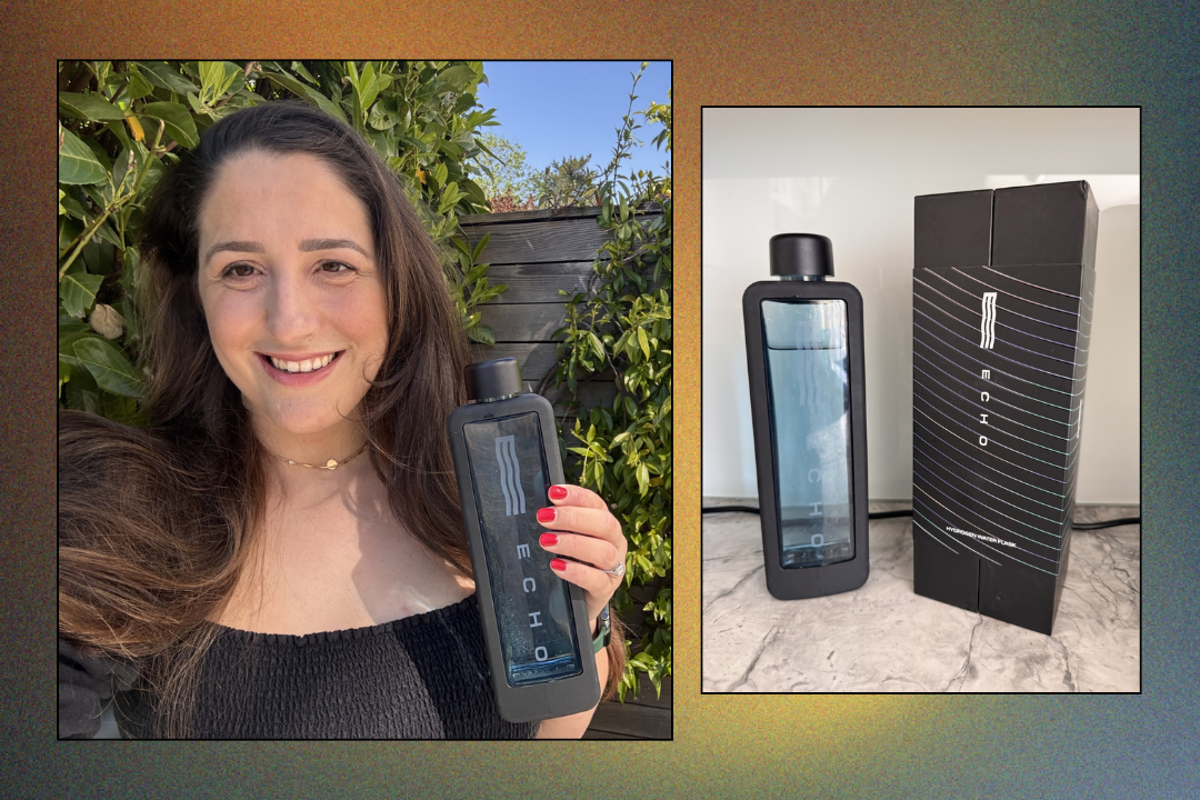
“Thousands have lived without love, not one without water,” said W. H. Auden. Though water is life’s most essential and vital resource, the majority of Brits drink less than a litre of water a day – far below the recommended daily dose.
Our chronic dehydration is a problem because water is vital for the health of every single cell, tissue and organ in our bodies. It regulates our body temperature, aids our digestive system, helps our kidneys clear out toxins and waste, lubricates and cushions joints, and can even help you lose weight.
In countries where tap water is safe to drink, drinking enough water is considered one of the easiest and cheapest ways to stay healthy. Sure, you can splurge on pricey water from health shops, or add electrolytes, but just glugging eight glasses a day right from the tap is enough to keep us healthy and hydrated.
Given how fundamental hydration is to health, it’s no surprise that wellness trends often centre around enhancing the way we consume it. WaterTok gave us a fascination with Stanley Cups and AirUp bottles and now, hydrogen water bottles have entered the scene.
When I heard about the hydrogen water bottle phenomenon I was intrigued but sceptical. Ranging in price from £25 to £300, these water bottles infuse regular water with added hydrogen molecules that supposedly offer wellbeing benefits.
What is hydrogen water?
Devotees claim drinking hydrogen water can do everything from help with blood sugar control and weight management to reduced cholesterol and inflammation. It’s also said to help with seasonal allergies, fatigue, skin health and athletic performance thanks to its antioxidant properties.
Though sceptics have pointed out that hydrogen, being a gas, may not remain in water long enough to deliver actual benefits. Some health experts also maintain that our bodies already have built-in antioxidant systems that work efficiently enough on their own.
On TikTok, where hydrogen water is much-discussed, there are two very clear camps: on one side, those professing hydrogen water has changed their lives (and, suspiciously, sometimes offering discount codes for viewers), and those rolling their eyes, calling the trend a scam and marvelling that people pay good money for “a bottle that makes water into water”.
One of the biggest proponents for hydrogen water is Gary Brecka, a biologist and biohacker. On his podcast The Ultimate Human, Brecka waxes lyrical about the unique benefits of hydrogen water. Brecka says that science shows it’s, “the best water you can put in your body”.
But given that water is the most abundant substance on the planet, and its health benefits are already practically endless, do we really need to try to “hack” it?
Read more: How to spot the symptoms of burnout and treat them, according to wellbeing experts
Julia Etman, a nutritionist at Healf, says that the core benefit of hydrogenised water that’s been observed in studies is antioxidant support but there isn’t a great deal of data to support far-reaching health claims.
“While research is ongoing, early findings suggest hydrogen-enriched water could help counter oxidative stress – one of the key contributors to cellular ageing and fatigue. It’s also being explored for its potential role in supporting overall cellular and metabolic health.”
“Molecular hydrogen is one of the smallest and most bioavailable molecules in nature,” she explains. “It can slip into cells, where it may help neutralise harmful free radicals – the kind produced by poor sleep, stress, or intense physical activity. What sets it apart is its selective antioxidant action, meaning it only targets the bad free radicals, leaving the beneficial ones to do their job.
"Preliminary research suggests that by reducing oxidative stress, hydrogen water may support better nutrient absorption and contribute to a balanced gut microbiome, further enhancing overall wellbeing. Some people report improvements in energy, recovery, and inflammation.”
While Julia says that “scepticism is always valid” and that there’s no "one-size-fits-all approach to wellbeing”, she points to a growing body of research – more than 1,300 studies globally – which examine the effects of molecular hydrogen, including in water form.
“While some early studies suggest potential benefits for inflammation, metabolism, athletic recovery, and even mood, the science is still developing,” Julia adds. “Most studies are small-scale or preliminary, and more robust, long-term human trials are needed. The results are encouraging, but not yet conclusive.”
The jury seemed to be out on the effects so I decided to order the Echo Water Flask at an eye-watering £299 to test them for myself.
The new biohackers: Inside the quiet rebellion of women upgrading their bodies
Is it safe to exercise in hot weather? The experts weigh in
Best electrolyte drinks and tablets to keep you hydrated, tested by our fitness editor
Tongue scraping and oil pulling: Does balancing your oral microbiome hold the key to better health?
Echo water flask
.png)
While I may be lacking in some areas of health and wellness – I’m partial to eating too much spaghetti, have a tendency to watch “just one more episode” instead of getting eight hours of beauty sleep and probably don’t spend enough time on the expensive Peloton I shelled out for – my water intake is one area that I excel in.
A few years ago, I banished fizzy drinks from my diet. I never drink alcohol and I drink three litres of water a day, including lots of healthy green tea. Despite these excellent credentials, the thought of hacking my hydration excited me because even with my good habits, I often feel zapped of energy and dehydrated.
While I was waiting for the flask to arrive, I received an email with a timeline of what to expect. I was promised everything from “changing health at a cellular level”, “feeling reduced inflammation” and “increased aerobic performance” to “lower blood pressure”, “better digestion”, “reduced liver fat”, “less anxiety”, “improved gut microbiome” and even “potential anti-ageing benefits”.
My rational mind knew this sounded too good to be true, but I couldn’t help feeling excited about this elixir of immortality, currently winging its way to me in the post.
The Echo flask arrived in a snazzy black box, and immediately looked more aesthetically impressive than any of the other flasks, Stanley cups and Stanley dupes waiting in the cupboard. I imagined my other bottles feeling like Woody from Toy Story, watching me unbox the shiny new Buzz Lightyear as they sat sadly behind me, realising they’d soon be forgotten.
The smart bottle and its accompanying app were both straightforward to set up. While it hydrogenates, the bottle turns a pleasing shade of turquoise, and bubbles rise to the top. There’s a fancy screen on the side that counts down the 10 minutes until your water is hydrogenated, and you can also use this screen to operate cleaning cycles and pair the bottle with your phone.
The app nudges you when you haven’t been drinking enough too – useful if you tend to forget to hydrate when you’re busy.
.png)
The bottle’s 12-ounce capacity is on the smaller side. Options for larger capacities include a 1700ml hydrogen water pitcher at £950.99 and a large hydrogen water generator at a whopping £1,300.
For those on a tighter budget, or who feel doubtful about the benefits, hydrogen tablets offer a lower-cost way to explore the potential benefits before committing to a bottle purchase.
I tested the Echo Flask for a few weeks, drinking at least three flasks a day, and over this time, I did find myself drinking more water, though initially it was admittedly to get the small dopamine hit of watching the bottle light up, turn blue and begin to audibly bubble (during slow days of sitting at my desk for nine hours straight, I’ll take the small thrills).
Over my time testing the Echo Flask, I was intrigued to see how, if at all, using the flask would affect me. My insomnia has plagued me since I was a child and I lie awake for hours at night, thoughts dancing through my head insistently, then when I finally fall asleep too late, it causes me to be exhausted the next morning. The exhaustion lasts all day, until bedtime, when I’m suddenly on high alert, and so the cycle continues.
I’ve tried plenty of remedies for this ailment throughout my life, including hypnotherapy, reflexology, various supplements and so on. But after a few weeks of sipping from the Echo Flask religiously, dare I say without jinxing it, I found myself drifting off earlier than usual without the usual urge to stay awake and doom scroll.
Another pleasant and unexpected side effect was that I found my appetite had decreased slightly. I work from home and noticed my spontaneous visits to the kitchen to pick up some popcorn or a bowl of cereal were less frequent. I also noticed that my skin, normally blighted by eczema, and dry and flaky no matter how much moisturiser I use, felt smoother and looked brighter than it had for years.
While I was pleased to notice these changes, I took them with a pinch of salt. I know that fluctuations in sleep patterns, appetite, weight loss and so on can be down to everything from hormonal changes to the weather. Only time will tell if I have my new bottle to thank, or if I was just less stressed or hormonal during that time period. Could it have just been down to drinking even more water than usual? Or, perhaps, the power of the placebo effect?
Buy now £299.00, healf.com
Vassiliki Sinopoulou, a registered dietitian and Lecturer in Evidence Synthesis at the University of Central Lancashire, is sceptical about the purported benefits of hydrogen water, though says that in theory the claims about improved wellness make sense.
“Whilst there are some theoretical benefits to having more hydrogen in drinking water, there’s no evidence to support it yet,” Vassiliki explains. “Theoretically, extra hydrogen in water can bond with harmful molecules that could cause inflammation, oxidative stress which causes cell damage, or cancer, and neutralise them.”
“It’s important to remember that any theoretical benefits from hydrogen water would be preventative. It might be able to hinder any new damage, but cannot treat existing ailments.” says Sinopoulou.
“When considering purchases of hydrogen water products, which tend to be very expensive, consumers need to be aware that any supposed health claims of hydrogen water have not been proven,” Sinopoulou cautions. “If you want the potential benefits of hydrogen water, there are proven and more affordable ways to support your health.”
“Hydrogen water can’t replace a healthy lifestyle, so a balanced diet and regular exercise are the best way to lower the risk of the same diseases which hydrogen water is thought to prevent.”
Before rushing to spend considerable sums of money on a hydrogen water bottle, water expert and CEO of FloWater Raz Razgaitis says it’s worth bearing in mind that most of us aren’t even drinking enough regular water, so that might be a more sensible place to start.
“Most of the studies often referenced involve hydrogen delivered in ways that don’t translate to drinking it, and for the average person, just drinking enough plain water is still the bigger priority,” he explains.
“If a cool-looking bottle helps someone stay hydrated, that’s a win in itself. But right now, I haven’t seen enough credible, peer-reviewed evidence to consider it essential. Like a lot of wellness trends, it’s worth keeping an open mind, but also one that's critical."
The verdict
So, at the end of my experiment, was my hydrogen water bottle the holy grail or just more trendy TikTok pseudoscience?
Hydrogen water may have helped me sleep better and cleared up my skin, or maybe I was just drinking a little more water. Either way, I’ll admit that I’ve grown surprisingly attached to my pricey bit of kit, and will continue to enjoy a boost of hydration, and a small thrill, every time it lights up like a lava lamp and bubbles like a cauldron.
Much more scientific research needs to be done to obtain definitive answers and £299 is a lot of money to spend without concrete evidence. Hydrogen water may offer exciting-sounding benefits, and if an expensive bottle gets you to hydrate more, great. But for most of us, tap water, consistency, and healthy habits are still the gold standard we should aim for.







